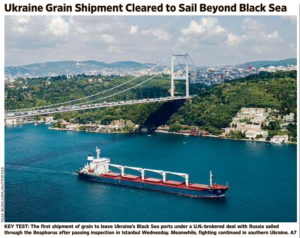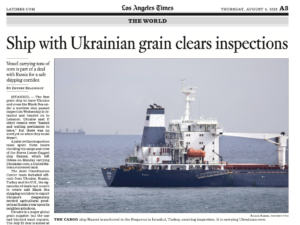As a result of the attack on Iran, nitrogen fertilizer at the port of New Orleans has seen an increase in price this week. Urea prices for barges in New…
First Ship With Ukraine Grain Cleared- Sails to Lebanon, as Farmers Continue Reaping Crops in War Zone
Financial Times writers Laura Pitel and Felicia Schwartz reported yesterday that, “The first grain ship to set sail from Ukraine in months was cleared to embark on the final leg of its journey after passing an inspection by a team of international monitors in Turkish waters.
“The Sierra Leone-flagged Razoni, carrying 26,000 tonnes of Ukrainian corn, left the northern entrance of Turkey’s Bosphorus strait on Wednesday and headed for the Lebanese port of Tripoli.
“Prior to its departure, the bulk carrier underwent an inspection by representatives from Russia, Ukraine, Turkey and the UN under the terms of a deal struck by Moscow and Kyiv aimed at easing a global food crisis.”

The FT article noted that, “US secretary of state Antony Blinken called the departure of the Razoni a ‘significant step.’ But he also called on Russia to halt attacks on Ukrainian farmland, making it unusable and destroying agricultural infrastructure.”

An update in today’s Wall Street Journal indicated that, “The resumption of food shipments offers a lifeline for Ukraine’s economy. A study by the Kyiv School of Economics found that the cost of infrastructure damage caused by the war reached $108 billion. Most of the costs, the study noted, were caused by Russian rocket strikes on residential areas.”

And Associated Press writer Zeynep Bilginsoy reported in today’s Los Angles Times that, “Pictures tweeted by the Turkish Ministry of National Defense showed an inspector reaching into the Razoni’s open hold and touching some of its cargo: 26,527 tons of corn for chicken feed. The Razoni’s horn rang out as the inspectors left the ship, and it then headed off to Lebanon.
“The checks seek to make sure that outbound cargo ships carry only grain, fertilizer or related food and not any other commodities, and that inbound ships are not carrying weapons.”
1 Ağustos 2022 tarihinde Ukrayna'nın Odessa Limanı'ndan 27 bin ton mısır ile hareket eden ve dün akşam saatlerinde İstanbul Boğazı Karadeniz girişine ulaşan RAZONİ isimli gemi, bugün Müşterek Denetleme Timi tarafından denetlendi. Gemi Lübnan'a varmak üzere seyrine devam ediyor. pic.twitter.com/u5aAIjowy2
— T.C. Millî Savunma Bakanlığı (@tcsavunma) August 3, 2022
Meanwhile, Reuters writers Jonathan Saul and Carolyn Cohn reported yesterday that, “The London insurance sector is preparing to cover Ukrainian grains and fertiliser shipments through a secure corridor, voyages that may need up to $50 million of insurance cover per cargo, industry sources involved said on Wednesday.”
Elsewhere, New York Times writer Andrew E. Kramer reported today that, “Their uniforms are dusty jeans and tank-tops, and they drive tractors, not tanks, along the frontline in Russia’s war in Ukraine.
“But Ukrainian farmers face many of the same grave dangers as soldiers as they reap this year’s harvest. Across Ukraine, Russian artillery and mines have killed tractor drivers. Thousands of acres of ripe wheat have burned from strikes. Fields are pockmarked where incoming shells have left craters.
“Serhiy Sokol, a wheat, barley and sunflower farmer in southern Ukraine, said he and his farmhands plucked dozens of aluminum tubes from Russian rockets from the black earth as they worked his fields. Last month, he said, a neighbor’s combine harvester ran over a mine, blowing off one of its fat tires but sparing the driver.”
Kramer indicated that,
The breakthrough deal that allowed ships carrying grain to depart from Ukraine’s southern ports this week may have solved a diplomatic problem, but it left a more pragmatic one hanging over Ukraine’s farming community: growing and reaping crops in a war zone, as powerful weapons rain destruction across some of the richest agricultural land in the world.
“The farmers say they have little choice. Much of Ukraine’s grain crop is winter wheat and barley, sown in early fall and harvested the following summer. After planting before the war began, farmers near the front must take risks now, lest they lose the entire year’s investment.”
“The U.S. Department of Agriculture, for example, has forecast that Ukraine’s wheat exports, worth $5.1 billion last year, will fall by half after this year’s harvest,” the Times article said.
And yesterday, Reuters writer Natalia Zinets reported that, “Ukraine’s forecast for its wartime 2022 harvest has increased to 65-67 million tonnes of grain from 60 million tonnes, Prime Minister Denys Shmygal said on Wednesday.
“In a Telegram message, he praised farmers for pressing ahead with the harvest despite the war, even in areas where shelling continues.”





